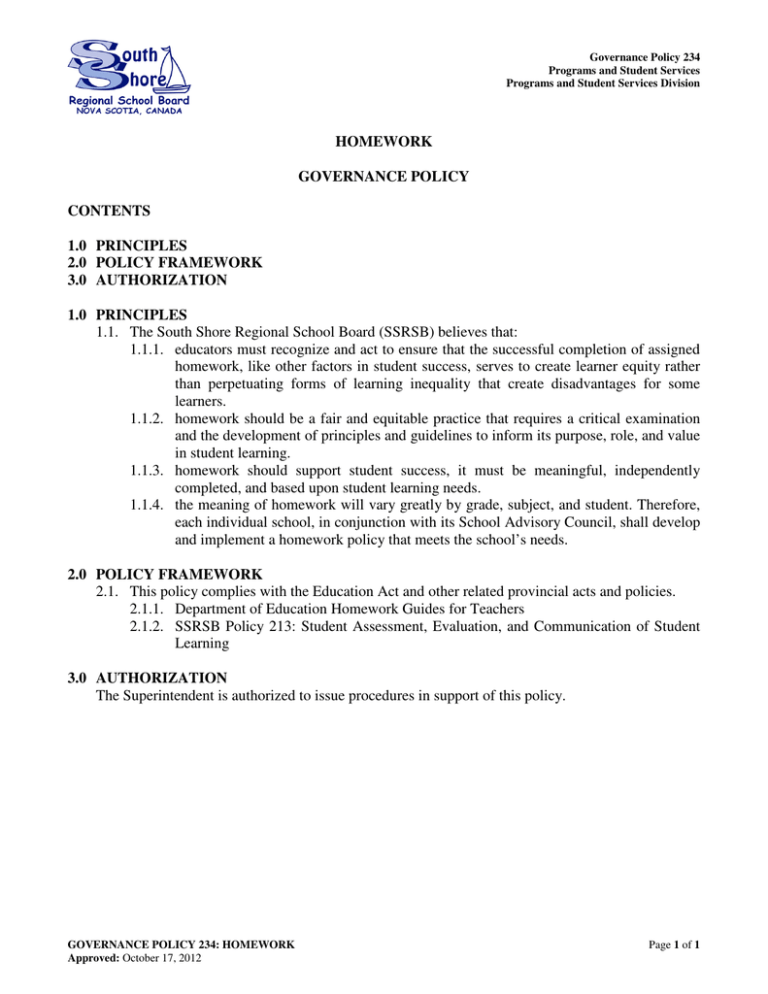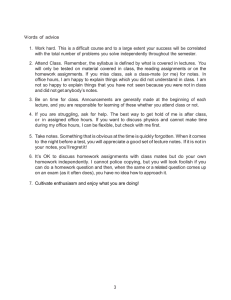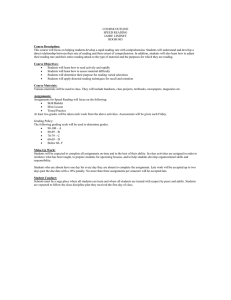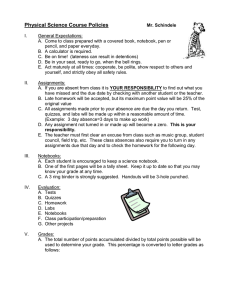HOMEWORK GOVERNANCE POLICY CONTENTS 1.0
advertisement

Governance Policy 234 Programs and Student Services Programs and Student Services Division HOMEWORK GOVERNANCE POLICY CONTENTS 1.0 PRINCIPLES 2.0 POLICY FRAMEWORK 3.0 AUTHORIZATION 1.0 PRINCIPLES 1.1. The South Shore Regional School Board (SSRSB) believes that: 1.1.1. educators must recognize and act to ensure that the successful completion of assigned homework, like other factors in student success, serves to create learner equity rather than perpetuating forms of learning inequality that create disadvantages for some learners. 1.1.2. homework should be a fair and equitable practice that requires a critical examination and the development of principles and guidelines to inform its purpose, role, and value in student learning. 1.1.3. homework should support student success, it must be meaningful, independently completed, and based upon student learning needs. 1.1.4. the meaning of homework will vary greatly by grade, subject, and student. Therefore, each individual school, in conjunction with its School Advisory Council, shall develop and implement a homework policy that meets the school’s needs. 2.0 POLICY FRAMEWORK 2.1. This policy complies with the Education Act and other related provincial acts and policies. 2.1.1. Department of Education Homework Guides for Teachers 2.1.2. SSRSB Policy 213: Student Assessment, Evaluation, and Communication of Student Learning 3.0 AUTHORIZATION The Superintendent is authorized to issue procedures in support of this policy. GOVERNANCE POLICY 234: HOMEWORK Approved: October 17, 2012 Page 1 of 1 Administrative Procedures 234 Programs and Student Services Programs and Student Services Division HOMEWORK ADMINISTRATIVE PROCEDURES CONTENTS 1.0 2.0 3.0 4.0 PROCEDURES TIME SPENT ON HOMEWORK HOMEWORK GUIDELINES RESPONSIBILITIES 1.0 PROCEDURES 1.1. In the development of a school homework policy, the staff and School Advisory Council shall consider the following: 1.1.1. Individual student strengths and challenges, learning styles, and cultural diversity shall be considered when assigning homework to ensure that assignments are differentiated and adapted appropriately. 1.1.2. Homework should be designed to require no additional teaching outside the classroom so that students understand what is expected of them before leaving school. 1.1.3. Homework assignments do not require resources or technology to which students may not have access. 1.1.4. Homework assignments should be designed to involve families in supporting their children’s learning, but should not teach new concepts. 1.1.5. Homework should be viewed as a means of enhancing student learning and shall not be punitive or negative in nature. 1.1.6. Teachers of a specific grade level and homeroom should mutually coordinate the frequency, length, and difficulty of homework assigned so that it is realistic and fair for all students. 1.1.7. At the beginning of the school year or semester, the teacher shall provide students and families with the value that homework will have in determining a final grade. 1.1.8. It is expected that homework shall be reviewed by the teacher and returned to students with appropriate feedback in a reasonable period of time. 1.1.9. In general, homework shall not be assigned over regular extended school vacations, such as winter and March Breaks. 1.1.10. It shall not be the responsibility of staff to prepare homework packages for students whose families permit their child to be absent from school for extended holidays or other family initiated absences. For absences due to extended illness, families may contact the school principal to discuss available options. 1.1.11. Families are always encouraged to communicate with the school if they have concerns with homework expectations for their child. 1.1.12. Homework must consider cultural diversity. 1.1.13. Individual school homework policies shall be available to the school community. 1.2. Homework is not necessarily a daily requirement. If project work is assigned as an alternative to daily homework, then ample time must be allotted over several weeks for the completion of ADMINISTRATIVE PROCEDURES 234: HOMEWORK Approved: October 17, 2012 Page 1 of 4 Administrative Procedures 234 Programs and Student Services Programs and Student Services Division the project. Project work is not intended to be assigned for completion during holiday periods including winter and March Breaks. 2.0 TIME SPENT ON HOMEWORK 2.1. Depending on the age and developmental level of the student, homework takes different forms and the time expected to be spent on homework varies. 2.1.1. Grade Primary: Homework should not be assigned to students in grade primary. Families are encouraged to engage in early learning activities that support emerging skills, such as playing, talking, listening, viewing and reading together. Teachers may make suggestions and/or provide resources to support home-based learning activities. 2.1.2. Grades 1-3: Homework in grades 1-3 should be limited to continuing to foster family support for developing skills, by reading, writing, talking, listening, viewing, and playing together. Teachers may provide resources, such as books for reading practice or interactive math games, and suggest other interactive activities. 2.1.3. Grades 4-6: Homework may take the form of home reading programs, preparation for class work, research and project work, extension of the curriculum, review and practice activities and assigned physical activity. Recommended maximum time, four nights per week at grade 4 is 20-30 minutes per day; at grade 5, 30-40 minutes per day; and at grade 6, 40-50 minutes per day. 2.1.4. Grades 7-9: Homework continues to take the form of home reading programs, preparation for class work, research and project work, extension of the curriculum, review and practice activities and assigned physical activity. Recommended maximum time, four nights per week at grades 7 and 8 is 60 minutes per day; at grade 9, 90 minutes per day. 2.1.5. Grades 10-12: Homework assignments can take several different forms including reading and writing, preparation for class, studying for tests and examinations, group project work, independent study, independent research. Recommended maximum time, four nights per week at grade 10 is 90 minutes per day; at grade 11, 120 minutes per day; and grade 12, 120 minutes per day. 2.1.5.1. Students who are in the International Baccalaureate (IB) Diploma program, IB Certificate courses, or other advanced courses can expect to have heavier homework loads. 3.0 HOMEWORK GUIDELINES 3.1. Homework guidelines should include: 3.1.1. established guiding principles for the assignment of homework. 3.1.2. a description of teacher checks to ensure that homework assignments can be completed by students within the provincially recommended time allotment. 3.1.3. information for families about establishing an environment in the home or access to an environment and time for the regular completion of homework. 3.1.4. descriptions of how homework connects with the school program. 3.1.5. sample flexible schedules for students to complete homework assignments. 3.1.6. a commitment to provide students with advance notice so that they may plan their homework completion and balance family and community commitments. 3.1.7. confirmation that homework need not be a daily requirement. ADMINISTRATIVE PROCEDURES 234: HOMEWORK Approved: October 17, 2012 Page 2 of 4 Administrative Procedures 234 Programs and Student Services Programs and Student Services Division 3.1.8. identification of opportunities for students to complete homework at school, such as a homework club. 3.1.9. identification of key periods, including holiday periods, when homework will not be assigned. 3.1.10. recognition that students and their families need opportunities to negotiate time for homework. 3.1.11. commitment to coordinate within the school homework assignments from different teachers. 3.1.12. processes to discuss the impact of homework with students and families. 3.1.13. a communication plan to ensure that the entire school community, including students and their families, knows the school guidelines on homework. 3.2. Homework is: 3.2.1. purposeful learning designed to meet identified needs. 3.2.2. a recommended strategy to support students in finding time to read for pleasure. 3.2.3. a recommended strategy to support students in completing some portions of the writing process outside of regular class time. 3.2.4. an opportunity for students to independently conduct primary research in the home and community. 3.2.5. an opportunity for students to independently reflect on and apply in-school learning. 3.2.6. a supportive strategy designed to assist students as they prepare for assessments. 3.2.7. a recommended way for students to practice skills that they understand. 3.2.8. an activity that is usually completed independently and with no requirement for intervention by family or the teacher. 3.3. Homework is not: 3.3.1. busy work. 3.3.2. an effective way for students to practice skills that they do not understand. 3.3.3. a recommended strategy to teach students time management. 3.3.4. a “catch-up” strategy when a student is routinely unsuccessful in managing in-class work time. 3.3.5. a way for students to regularly complete in-class work. 3.3.6. a recommended activity for winter and March breaks. 3.3.7. always necessary or recommended. 3.3.8. ever to be used as a disciplinary or punishment measure. 3.3.9. assigned marks for the purpose of calculating grades. 3.4. Homework should: 3.4.1. be developmentally appropriate so that it can be completed independently. 3.4.2. consolidate classroom learning, either through specific activities or through projectbased learning. 3.4.3. address learning needs and guide student choice among well-designed learning activities. 3.4.4. be timed, planned, coordinated, and monitored by teachers who share a group of students. ADMINISTRATIVE PROCEDURES 234: HOMEWORK Approved: October 17, 2012 Page 3 of 4 Administrative Procedures 234 Programs and Student Services Programs and Student Services Division 3.4.5. 3.4.6. 3.4.7. 3.4.8. frequently require the practice of physical skills. be a reasonable and rational undertaking that engages students in inquiry. encourage students to contribute positively to their communities. encourage and support reflection by students on their learning preferences, achievements, and goals. 3.4.9. facilitate communication between the home and school in support of student success. 3.4.10. accommodate students’ out-of-school schedules. 3.5. Homework should not 3.5.1. create inequity or otherwise disadvantage students’ learning success due to time or resources available within the family to complete homework tasks. 3.5.2. exceed the recommended time limits. 3.5.3. create an economic burden for families. 4.0 RESPONSIBILITIES It shall be the responsibility of the Superintendent to ensure these administrative procedures are followed. ADMINISTRATIVE PROCEDURES 234: HOMEWORK Approved: October 17, 2012 Page 4 of 4



